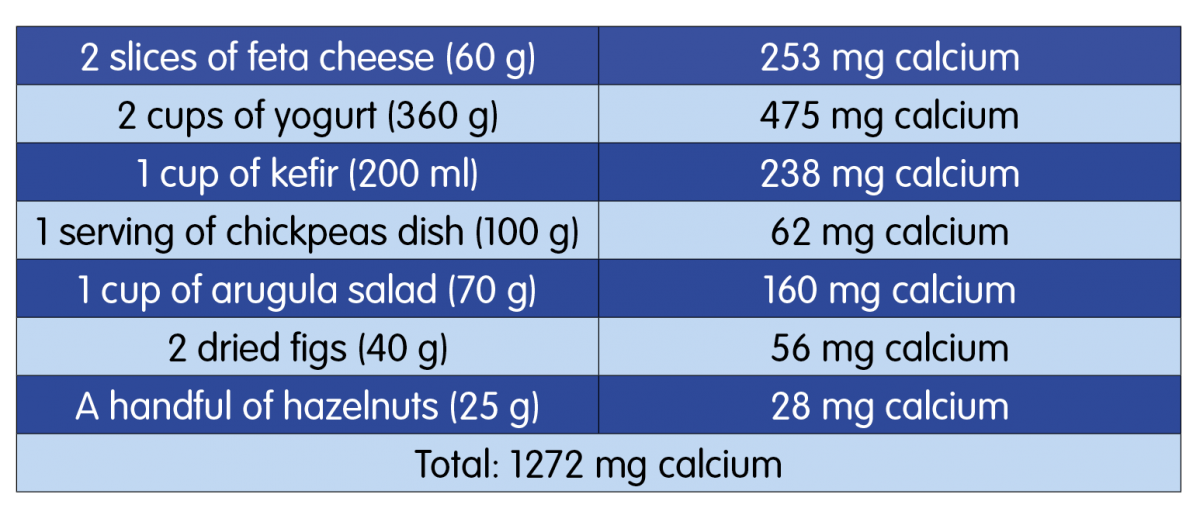Calcium is the most abundant mineral in the body and is required for many different processes, including bone formation, muscle contraction, and enzyme and hormone functioning. Adequate calcium intake during pregnancy supports the development of the baby’s skeletal structure and protects the mother’s bone health.
Beware of insufficient calcium intake during pregnancy!
Insufficient calcium intake during pregnancy affects the bone health of both the mother and the baby negatively, while at the same time it may increase the risk of developing conditions such as intrauterine growth restriction, low birth weight, preterm birth, and preeclampsia.
Calcium needs can be met by diet.
Hormonal changes during pregnancy increase the absorption and use of calcium. The World Health Organization (WHO), recommends a calcium intake of 1200 mg/day for pregnant women. The daily need can be easily met by adding calcium-rich foods to the diet. The best sources of calcium are milk and dairy products such as yogurt, kefir, cheese. In addition, sesame, molasses, green leafy vegetables, peanuts, hazelnuts, legumes and dried fruits are among good sources of calcium.
Sample foods that can provide support to meet the daily calcium need;

Do not unconsciously use supplements!
Calcium supplementation may be recommended by the physician for the prevention of preeclampsia in populations with low calcium intake and especially in pregnant women at high risk of developing hypertension, but there is no need for additional supplementation in pregnant women who are healthy and have adequate dietary calcium intake. Excessive calcium consumption can increase the risk of urinary stones and urinary tract infections and reduce the absorption of other essential micronutrients. Therefore, calcium supplements should be used only when the physician deems it necessary.
An important point: vitamin D
Vitamin D is essential for calcium and bone metabolism, and low levels of vitamin D during pregnancy can impair the body’s use of calcium. It is important to supplement with vitamin D if the physician deems it appropriate. With this, the best source of vitamin D is the sun; also egg yolks oily fish such as tuna and salmon are also sources of vitamin D.
Resources:
- Willemse, J. P. M. M., Meertens, L. J. E., Scheepers, H. C. J., Achten, N. M. J., Eussen, S. J., van Dongen, M. C., & Smits, L. J. M. (2020). Calcium intake from diet and supplement use during early pregnancy: the Expect study I. European journal of nutrition, 59(1), 167–174. https://doi.org/10.1007/s00394-019-01896-8
- World Health Organisation (2013) Guideline: calcium supplementation in pregnant women. Geneva, World Health Organization http://apps.who.int/iris/bitstream/10665/85120/1/9789241505 376_eng.pdf. Assessed 6 Jun 2016
- Korhonen, P., Tihtonen, K., Isojärvi, J., Ojala, R., Ashorn, U., Ashorn, P., & Tammela, O. (2022). Calcium supplementation during pregnancy and long-term offspring outcome: a systematic literature review and meta-analysis. Annals of the New York Academy of Sciences, 1510(1), 36–51. https://doi.org/10.1111/nyas.14729
- Khaing, W., Vallibhakara, S. A., Tantrakul, V., Vallibhakara, O., Rattanasiri, S., McEvoy, M., Attia, J., & Thakkinstian, A. (2017). Calcium and Vitamin D Supplementation for Prevention of Preeclampsia: A Systematic Review and Network Meta-Analysis. Nutrients, 9(10), 1141. https://doi.org/10.3390/nu9101141.
- Hacker, A. N., Fung, E. B., & King, J. C. (2012). Role of calcium during pregnancy: maternal and fetal needs. Nutrition reviews, 70(7), 397–409. https://doi.org/10.1111/j.1753-4887.2012.00491.x
- Tihtonen, K., Korhonen, P., Isojärvi, J., Ojala, R., Ashorn, U., Ashorn, P., & Tammela, O. (2022). Calcium supplementation during pregnancy and maternal and offspring bone health: a systematic review and meta-analysis. Annals of the New York Academy of Sciences, 1509(1), 23–36. https://doi.org/10.1111/nyas.14705
- https://turkomp.gov.tr/


